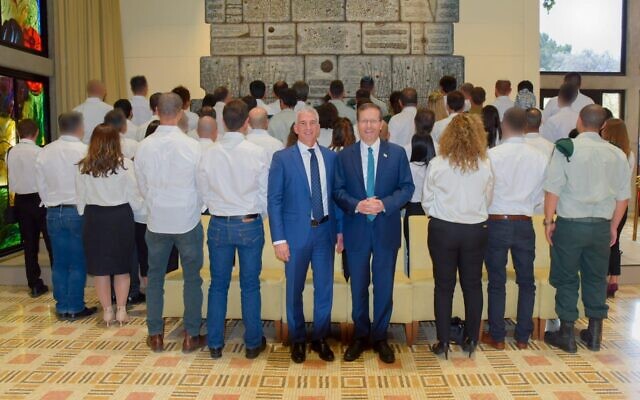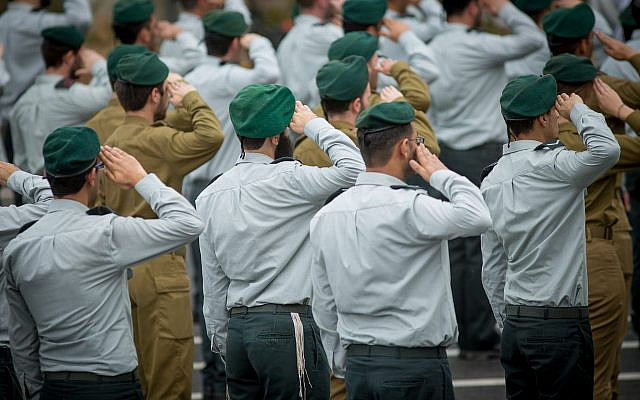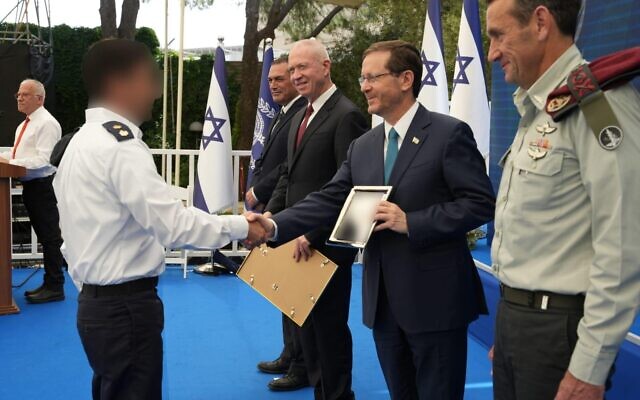IDF cyberdefense system, three other top secret projects awarded top security prize
Gallant says classified ventures send ‘clear message to our adversaries’; officer receiving award says his team developed tools to deal with ‘the most advanced’ cyberattackers
President Isaac Herzog and Defense Minister Yoav Gallant on Tuesday awarded the Israel Defense Prize, one of the highest honors bestowed by the state, to four teams for top secret work they accomplished over the past year.
The winners, announced last month, included an army team behind a “groundbreaking” cyberdefense system aimed at giving Israel “freedom of action in the digital space,” and three other completely classified projects led by various security organizations, according to the Defense Ministry.
The ceremony took place at Herzog’s residence in Jerusalem, with military chief Lt. Gen. Herzi Halevi, Shin Bet head Ronen Bar, Mossad chief David Barnea, and Defense Ministry Director General Maj. Gen. (res.) Eyal Zamir in attendance.
“Officers, soldiers, and fellow citizens, the women and men of our esteemed defense establishment — your invaluable contributions to Israel’s national strength are truly remarkable. Through your accomplishments, inventions, developments, and outstanding achievements, the security of our beloved nation is safeguarded, ensuring our ability to defend ourselves independently,” said Herzog.
Gallant said the classified projects “send a clear message to our adversaries that we are always prepared for any threat.”
The Israel Defense Prize award, which is named for the commander of Israel’s pre-state Hagana militia Eliyahu Golomb, is presented each year to people and projects deemed to have made a significant contribution to the country’s security.

The development of the cyberdefense system was led by the so-called Spectrum Division in the Israel Defense Force’s Computer Service Directorate, which is tasked with the defense of the electromagnetic spectrum, or radio waves. The development and deployment of the system also involved the Air Force, Military Intelligence and Navy.
“The cyber-dimension is abuzz, even when silence prevails in the physical dimensions. States, armies, criminal organizations, and terror groups clash with each other all the time. Cyberdefense is a fascinating field with great complexity; the defender has to block all breaches, while the attacker only needs one loophole to succeed,” said Lt. Col. “Aleph,” a senior officer in the Spectrum Division, who can only be identified by his first initial in Hebrew due to security concerns.
“However, when you understand the laws of the dimension, it is possible to turn the attacker’s advantage into a disadvantage. In the project… we were able to create concepts and tools to deal with the most advanced attackers, through research and development that lasted for years and in which we reached global breakthroughs in the field,” the officer said after receiving the prize.
The Defense Ministry said the “unique” system makes “groundbreaking use of the world’s most advanced technologies in order to guarantee the IDF security and freedom of action in the digital space, in the face of advanced and developing cyberthreats.”
The other three projects that won the prize this year remain largely classified.
One was a joint effort by the Shin Bet security agency and Military Intelligence’s Unit 8200. The ministry said the goal of the project was “the development and implementation of a unique technological system that enables intelligence and security superiority in many sectors.”
“The system is groundbreaking and has a significant contribution to the intelligence community’s efforts in the face of security challenges,” it added.
Another project was a joint effort between the Mossad spy agency and Unit 8200, which has a “significant and unique strategic contribution to the security of the country, embodying within it technological innovation and groundbreaking and extraordinary operational courage,” the ministry said.
The last was a project that involved Military Intelligence’s Special Operations Division, along with the Air Force, Navy, Israel Aerospace Industries and Rafael defense firms.
The ministry said that project was “an extraordinary technological solution that led to a breakthrough in operational capability… that directly contributes to maintaining the qualitative advantage of the IDF and the security of the State of Israel.”
“The project combines a number of innovative and unique technological developments made possible by the vision, determination and creativity of all project partners,” the ministry added.

“The Military Intelligence Directorate is all over the field and achieves a unique intelligence superiority with all the means at its disposal, thanks to the people who dedicate their lives to this challenging work,” said a senior officer in the IDF Military Intelligence Directorate, who cannot be named due to security concerns.
Last year’s winners included Israel’s Ofek spy satellites. The others were also mostly classified. Among the winners in 2019 were the Mossad agents behind the operation to steal Iran’s nuclear archive the year before.
The prize has been awarded annually by the president since 1958. Though the prize is sometimes given for lifetime achievement, generally the recipients are responsible for the creation of a new piece of technology or a specific operation.
Over the years, the prize has been awarded both to individuals, like Uzi Gal who received the first Israel Defense Prize in 1958 for creating the Uzi submachine gun, and to entire teams, like the group responsible for the development of the TROPHY anti-missile system that protects Israeli tanks and armored personnel carriers, which won in 2014.


No comments:
Post a Comment